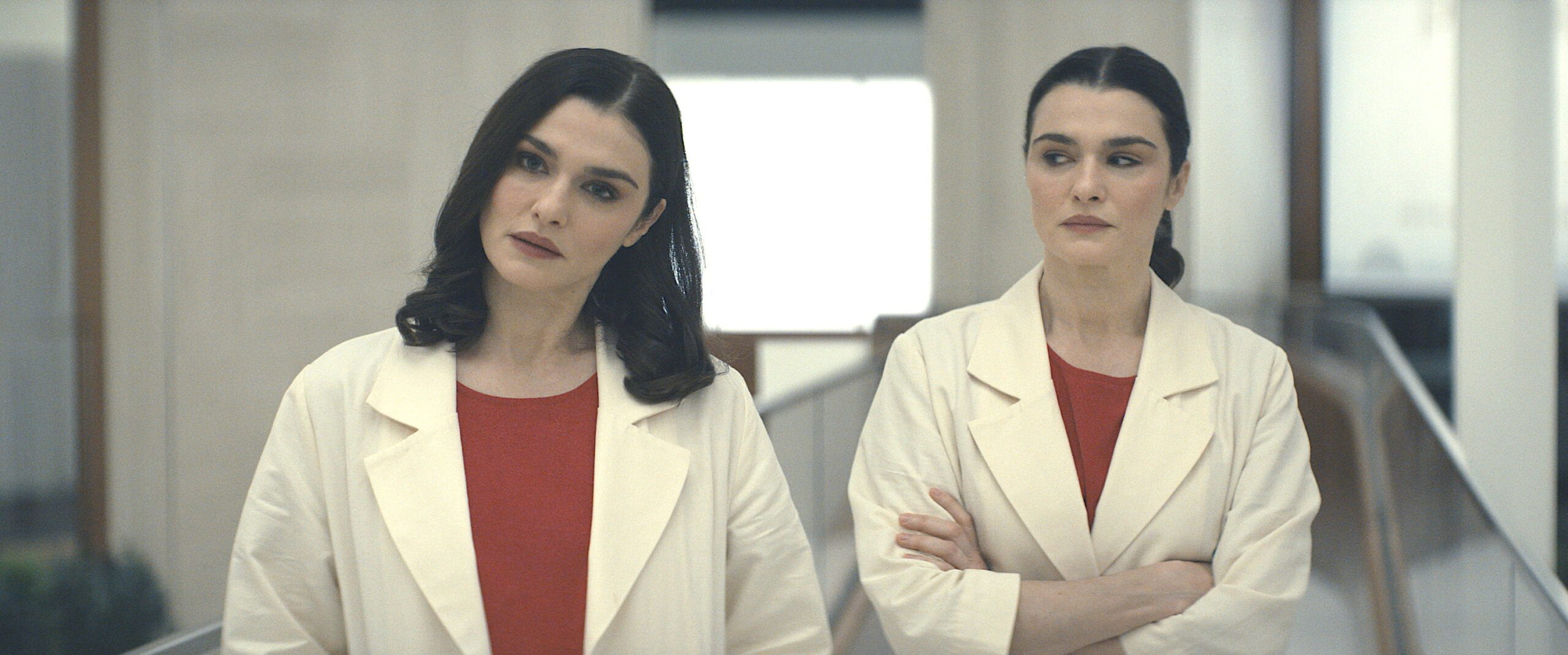Trying to remake the works of David Cronenberg for both a modern audience and a new medium is a difficult feat. But the idea of a gender-swapped, female-focused Dead Ringers miniseries—especially one that stars an actress as fabulous as Rachel Weisz attached in dual leading queer roles—is irresistible. Alice Birch’s series for Prime Video, based on Cronenberg’s 1988 Dead Ringers horror flick starring Jeremy Irons and loosely based on the novel Twins by Bari Wood and Jack Geasland, takes the iconic thriller and gives it a contemporary coat of queerness, chaos and a startling examination of codependency between sisters.
Set in present-day Manhattan, identical twin sisters Beverly (Weisz) and Elliot Mantle (also Weisz) are at the top of their careers as successful gynecologists. The two share the same dream of opening a birth-centre clinic, but each for their own ulterior motives. Level-headed Beverly is interested in revolutionizing women’s safety during birthing, meanwhile reckless, unfiltered Elliot wants to play mad scientist, genetically creating babies in incubators. Despite their differences in passions, the Mantles are thick as thieves, doing everything together. Whether it’s getting high on various substances or hooking up with anyone who catches their eye, the Mantles leverage their twisted tag team to get what they want. Elliot often reels in the bait, while Beverly pounces. Their modus operandi is upended when Beverly starts a serious romantic relationship with actress Genevieve (Britne Oldford), putting Elliot into a downward spiral. As their interpersonal relationship slowly cracks at the seams, the Mantles try to get funding for a state-of-the-art birthing clinic from a wealthy philanthropist (Jennifer Ehle).
As someone unfamiliar with Cronenberg’s original film, I had no attachment or expectations against which to compare this iteration. Outside of the gender reversals, Birch’s version manages to bear its own identity through its female-focused approach to women’s health. From the initial episode, director Sean Durkin (The Nest, Martha Marcy May Marlene) displays the honest truths about childbirth through graphic, bloody depictions of C-sections, while magnifying the negatives like miscarriages and maternal mortality. Unlike Cronenberg’s works, the body horror is coated in grounded realism rather than camp, causing more discomfort than one would feel in watching his movies.
As Elliot and Beverly, Weisz doubles the gay and the fun. She fleshes out each sister’s individuality with her charisma and subtle body movement so well that you never need to use Prime Video’s X-ray feature to assist you in identifying which Mantle sister is onscreen. Weisz relishes Elliot’s rambunctiousness, making the most out of quick-drawn dialogue and unpredictable actions; her performance leaves you constantly on the edge of your seat. As Beverly finds her individuality through romance, Elliot’s mind disintegrates, exhibiting disturbing sociopathic behaviour that makes everyone around her disturbed. She’s extremely frightening but hard to look away from.
Compared to Elliot’s chaotic bisexual energy, Beverely is the “good gay” sister. She may have a bit of a dark side and biting wit, with some damn good clapbacks influenced by her older twin sister, but she operates on an empathetic, humanistic level. Weisz draws out an endearing softness from Oldford’s performance, especially during the tender romantic scenes between them . Although Beverly’s budding romance with Genevieve is rushed, they share undeniably cute chemistry. As the sisters focus increasingly on raising funds for their birthing centre, the series shifts from commenting on women’s reproductive health to examining the codependent relationship shared between them.
For its six-episode count, the miniseries tries to have its cake and eat it too by exploring Mantle’s toxic codependency while integrating the familiar sci-fi psychological horror elements from both source materials. When Dead Ringers commits to fleshing out the complex sisterly love of its leads, it works wonders. I love how it presents a psychological depiction of abandonment through Elliot’s reckless actions, not knowing how to live a life without her sister at her side and how far back that dynamic goes. The penultimate episode, directed by Karyn Kusama and written by Susan Soon He Stanton, is an excellent feat of television, using flashbacks to the sisters’ infancy to parallel the action in the present.
When their sisterhood isn’t at the forefront, Dead Ringers is both overstuffed in its ideas and undeveloped in its execution. The science fiction aspects leave a lot to be desired. Elliot’s genetic experiment subplot is hardly present until the back half of the series. The social commentary on various themes involving women’s health and the influence of capitalism on women’s health flows in one ear out the other, all surface-level commentary. It drops the chance to make any salient observations, preferring to flip the script to examine the sisters’ relationship. The show compensates for its flaws through dark, comedic character writing with bite, but the overall effect rings hollow.
Dead Ringers benefits from a career-best performance from Weisz, who catapults this female-centric take on Cronenberg’s classic to its apex. Despite the series’ overabundance of underdeveloped ideas, Weisz’s performance and the intimate portrait of the Mantle twins’ codependency make for quality television.


 Why you can trust Xtra
Why you can trust Xtra


